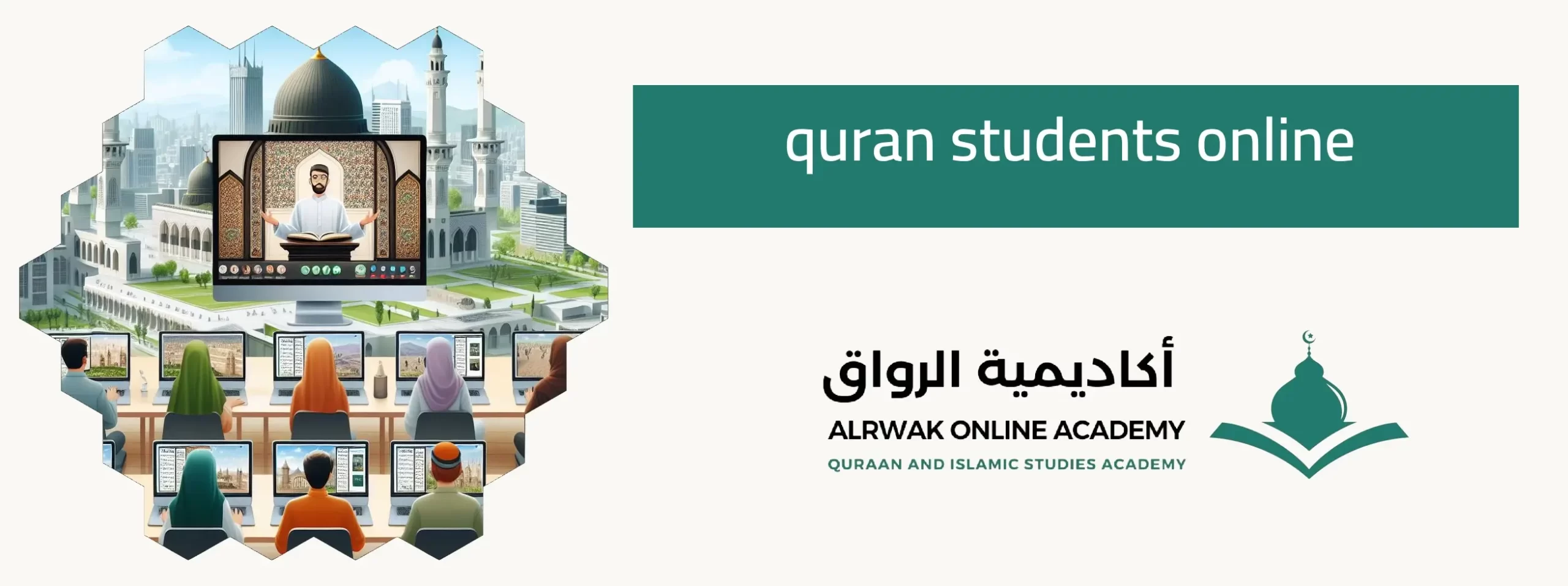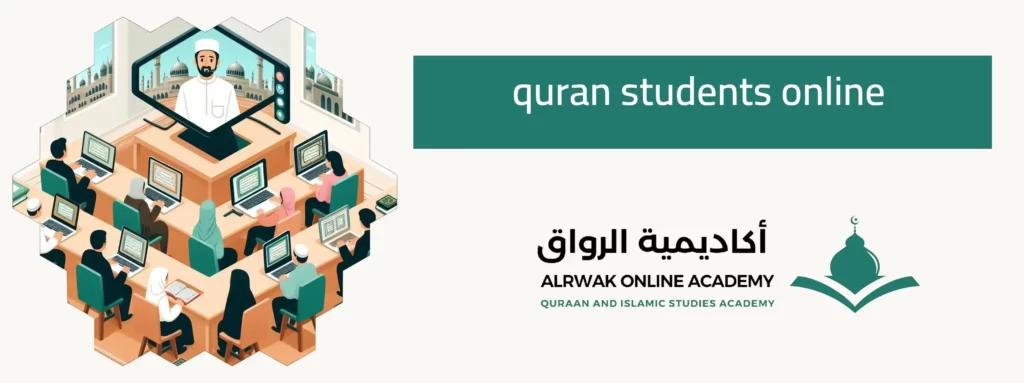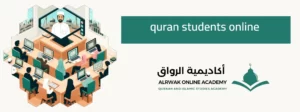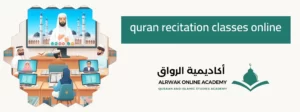In the era of digital advancement, traditional modes of education have undergone a significant transformation. This evolution is particularly evident in the realm of religious studies, where institutions and individuals alike have embraced online platforms to facilitate learning. One such area witnessing this shift is the study of the Quran, the holy book of Islam quran students online are increasingly turning to online resources and platforms to deepen their understanding and connection with the scripture. This paradigm shift offers numerous advantages and challenges, reshaping the landscape of Quranic education in profound ways.
quran students online
One of the primary reasons for the surge in quran students online is accessibility. With the internet becoming more widespread globally, individuals from remote areas or those with limited access to traditional educational institutions can now engage in Quranic studies. Online platforms offer flexibility in terms of timing and location, allowing students to tailor their learning experience according to their schedules. This accessibility is especially beneficial for working professionals, parents, or individuals with disabilities who may find it challenging to attend physical classes regularly.
Moreover, quran students online provides a personalized learning experience. Many platforms offer one-on-one sessions with experienced tutors, enabling students to receive individualized attention and guidance. This personalized approach caters to students’ unique learning styles and pace, fostering a deeper comprehension of the Quranic teachings. Additionally, online resources such as multimedia tools, interactive quizzes, and audiovisual materials enhance the learning experience, making it more engaging and effective.
Another significant advantage of quran students online is the opportunity for global collaboration and cultural exchange. Students from diverse backgrounds and geographical locations can come together in virtual classrooms, fostering cross-cultural understanding and dialogue. This diversity enriches the learning environment, offering unique perspectives and insights into the interpretation and application of Quranic principles in different contexts. Furthermore, online platforms often host discussion forums and community spaces where students can interact, share experiences, and seek advice from peers and mentors, creating a sense of belonging and camaraderie.
Despite these benefits, quran students online also presents challenges that must be addressed. One concern is the quality and authenticity of online resources and instructors. With the proliferation of platforms offering Quranic education, ensuring the credibility and expertise of tutors and the accuracy of course materials becomes crucial. Additionally, maintaining students’ motivation and discipline in a virtual setting can be challenging, as the absence of face-to-face interaction may lead to feelings of isolation or disengagement.
Furthermore, there are considerations regarding the preservation of traditional teaching methodologies and the oral transmission of Quranic knowledge. While online platforms offer innovative tools and technologies, they must complement rather than replace traditional methods of Quranic instruction, such as recitation, memorization, and tajweed (rules of Quranic pronunciation). Balancing the integration of technology with the preservation of these time-honored practices is essential to ensure the holistic development of Quran students.
In conclusion, the emergence of quran students online represents a significant advancement in religious education, offering accessibility, flexibility, and personalized learning experiences to students worldwide. By harnessing the power of technology, individuals can deepen their understanding of the Quran and enrich their spiritual journey irrespective of geographical barriers. However, it is essential to address challenges such as quality assurance, student motivation, and the preservation of traditional teaching methods to fully realize the potential of online Quranic education. As technology continues to evolve, so too will the methods and opportunities for Quran students to engage with the sacred text in meaningful and transformative ways.
Quran Classes for Kids
In today’s fast-paced and digitally driven world, parents are increasingly seeking ways to instill religious values and teachings in their children from a young age. One avenue gaining popularity is Quran classes tailored specifically for kids. These classes offer a structured and interactive environment where children can learn about the Quran, its teachings, and principles in a manner that is engaging, accessible, and age-appropriate.
One of the key aspects of Quran classes for kids is the use of innovative teaching methods that cater to their unique learning needs and developmental stages. Unlike traditional adult Quranic studies, which may focus heavily on memorization and in-depth analysis, children’s Quran classes incorporate storytelling, games, songs, and visual aids to make learning enjoyable and memorable. By integrating these interactive elements, educators can capture children’s attention and foster a deeper understanding and connection with the Quranic teachings.
Moreover, Quran classes for kids often emphasize character development and moral values derived from the Quran. Alongside learning the verses and teachings of the Quran, children are encouraged to reflect on the ethical lessons embedded within the scripture and apply them to their daily lives. Through discussions, role-playing, and real-life scenarios, kids learn the importance of compassion, honesty, generosity, and other virtues upheld by Islam, thereby nurturing their moral and spiritual growth.
Another crucial aspect of Quran classes for kids is the cultivation of a supportive and nurturing learning environment. Educators strive to create a safe space where children feel comfortable expressing themselves, asking questions, and sharing their thoughts and experiences related to the Quran. This sense of community and camaraderie fosters a positive attitude towards learning and encourages active participation, empowering children to develop a deeper connection with their faith and identity as Muslims.
Furthermore, Quran classes for kids often incorporate modern technology to enhance the learning experience. Educational apps, interactive websites, and multimedia resources provide supplementary materials that complement classroom instruction and allow children to engage with the Quran in diverse ways. These technological tools not only make learning more accessible and convenient but also cater to the digital-native generation, enabling them to harness the power of technology in their religious education.
In addition to the academic aspect, Quran classes for kids also play a crucial role in fostering cultural and social connections within the Muslim community. Many classes offer opportunities for children to interact with peers from similar backgrounds, forging friendships and building a sense of belonging. These communal bonds extend beyond the classroom, as families often participate in extracurricular activities, community events, and volunteer opportunities, strengthening their ties to the broader Muslim community.
Despite the numerous benefits, Quran classes for kids also face challenges that need to be addressed. One challenge is ensuring the quality and authenticity of the curriculum and instructors. With the proliferation of online resources and educational platforms, parents must carefully evaluate the credentials and expertise of educators to ensure their children receive accurate and reliable Quranic instruction. Additionally, maintaining children’s interest and motivation over time requires ongoing creativity and adaptability on the part of educators to keep the learning experience fresh and engaging.
In conclusion, Quran classes for kids offer a holistic approach to religious education, blending traditional teachings with modern pedagogical methods to engage and inspire young learners. By creating a nurturing environment, emphasizing moral values, integrating technology, and fostering community connections, these classes empower children to develop a deeper understanding and appreciation of the Quran and its teachings. As parents and educators continue to prioritize the spiritual development of the next generation, Quran classes for kids will play an essential role in shaping their religious identity and fostering a lifelong connection to their faith.
more: online quran academy

Quran Classes with Teachers & Tutors Online
In the digital age, accessing quality education has become more convenient and accessible than ever before. This trend extends to Quranic studies, where online platforms offering classes with teachers and tutors have gained considerable popularity. These virtual classrooms provide a dynamic and interactive learning environment, allowing students to engage with the Quran under the guidance of experienced instructors from anywhere in the world.
One of the primary advantages of Quran classes with teachers and tutors online is flexibility. Unlike traditional brick-and-mortar institutions, online platforms offer scheduling options that cater to students’ busy lifestyles. Whether balancing work, family responsibilities, or other commitments, learners can access Quranic instruction at their convenience, eliminating the constraints of time and location. This flexibility empowers students to take control of their learning journey and progress at their own pace, ensuring that religious education remains accessible to all, regardless of their circumstances.
Furthermore, Quran classes online provide a personalized learning experience tailored to individual student needs. With one-on-one sessions or small group settings, instructors can focus on addressing students’ specific strengths, weaknesses, and learning styles. This personalized approach allows for targeted instruction, ensuring that students receive the support and guidance necessary to grasp complex Quranic concepts and improve their recitation and understanding. Additionally, online platforms often utilize interactive tools and multimedia resources to enhance the learning experience, making it more engaging and effective.
Another significant advantage of Quran classes with teachers and tutors online is the diversity of expertise available to students. Through virtual platforms, learners have access to a global network of qualified instructors and scholars specializing in various aspects of Quranic studies. This diversity enriches the learning experience, exposing students to different interpretations, perspectives, and methodologies. Whether seeking guidance on recitation (tajweed), memorization (hifz), or understanding the Quran’s deeper meanings (tafsir), students can find an instructor whose expertise aligns with their learning goals and interests.
Moreover, Quran classes online foster a sense of community and camaraderie among students and instructors. Through virtual classrooms, discussion forums, and collaborative projects, learners can connect with like-minded individuals from diverse backgrounds and build meaningful relationships based on shared religious values and aspirations. This sense of belonging enhances the learning experience, providing students with a support network to navigate their spiritual journey and overcome challenges along the way.
Despite these benefits, Quran classes with teachers and tutors online also present challenges that must be addressed. One concern is the quality and authenticity of instruction in a virtual setting. With the proliferation of online platforms, ensuring the credibility and expertise of instructors becomes paramount. Parents and students must conduct thorough research and vetting to verify the qualifications and credentials of educators, as well as the integrity of the curriculum and instructional materials.
Additionally, maintaining student engagement and motivation in an online environment can be challenging. Without the physical presence of peers and instructors, students may struggle with feelings of isolation or disconnection, impacting their enthusiasm for learning. Educators must employ creative strategies to foster a sense of community and collaboration, such as virtual group activities, interactive discussions, and peer-to-peer mentoring, to keep students actively engaged and invested in their Quranic studies.
In conclusion, Quran classes with teachers and tutors online offer a flexible, personalized, and diverse approach to religious education, empowering students to engage with the Quran in meaningful and transformative ways. By leveraging technology, students can access quality instruction from qualified educators around the globe, regardless of their geographical location or schedule constraints. However, ensuring the quality of instruction, maintaining student engagement, and fostering a sense of community remain ongoing challenges that require careful attention and innovation. As technology continues to evolve, so too will the opportunities for students to deepen their understanding and connection with the Quran through online learning platforms.
more: quran recitation classes online
Quran Lessons Online
In today’s interconnected world, the internet has revolutionized the way people access knowledge and engage in learning. This paradigm shift extends to religious education, including Quranic studies, with the emergence of online Quran lessons. These virtual platforms offer individuals the opportunity to deepen their understanding of the Quran from the comfort of their homes, providing flexibility, accessibility, and a wealth of resources to support their learning journey.
One of the most significant advantages of Quran lessons online is the convenience they offer. With busy schedules and commitments, many individuals find it challenging to attend traditional in-person classes regularly. Online Quran lessons eliminate the need for commuting to a physical location, allowing students to access instruction at their convenience. Whether they’re juggling work, school, or family responsibilities, learners can carve out time for Quranic studies that fits seamlessly into their daily routines, enabling them to pursue their religious education without sacrificing other obligations.
Furthermore, online Quran lessons provide a flexible learning environment that caters to diverse learning styles and preferences. Through live sessions, pre-recorded lectures, interactive quizzes, and multimedia resources, students have the flexibility to choose the format and pace that best suits their needs. This adaptability empowers learners to tailor their learning experience according to their individual preferences, whether they prefer visual, auditory, or kinesthetic modes of learning. Additionally, online platforms often offer self-paced courses, allowing students to progress through the material at their own speed, revisiting concepts as needed to ensure comprehension and retention.
Another significant advantage of Quran lessons online is the accessibility they afford to individuals from all walks of life. Regardless of geographical location or socioeconomic status, anyone with an internet connection can access high-quality Quranic instruction. This accessibility is especially beneficial for those living in remote areas or regions with limited access to traditional educational resources. Additionally, online Quran lessons accommodate learners with disabilities or mobility restrictions, providing an inclusive learning environment where everyone can participate and engage with the material on an equal footing.
Moreover, online Quran lessons foster a sense of community and connection among students and instructors. Through virtual classrooms, discussion forums, and social media groups, learners can interact with peers from around the world, exchanging ideas, insights, and experiences related to Quranic studies. This global network of support and camaraderie enhances the learning experience, providing students with a sense of belonging and accountability as they progress through their studies. Additionally, online platforms often feature qualified instructors and scholars who can provide guidance, mentorship, and personalized feedback to help students navigate their spiritual journey.
Despite these advantages, Quran lessons online also present challenges that must be addressed. One concern is the quality and authenticity of instruction available on digital platforms. With the proliferation of online resources, it can be challenging for students to discern credible sources from misinformation or misinterpretation. Therefore, it is essential for learners to conduct thorough research and vetting to ensure they are receiving accurate and reliable Quranic instruction from qualified educators.
Furthermore, maintaining student engagement and motivation in an online learning environment can be challenging. Without the physical presence of peers and instructors, students may struggle with feelings of isolation or disconnection, impacting their enthusiasm for learning. Educators must employ innovative strategies to foster a sense of community and collaboration, such as interactive discussions, virtual group activities, and peer-to-peer mentoring, to keep students actively engaged and invested in their Quranic studies.
In conclusion, Quran lessons online offer a convenient, flexible, and accessible approach to religious education, empowering individuals to deepen their understanding of the Quran regardless of their geographical location or schedule constraints. By leveraging technology, students can access high-quality instruction, interact with peers from diverse backgrounds, and engage with a global community of scholars and educators. However, ensuring the quality of instruction and maintaining student engagement remain ongoing challenges that require careful attention and innovation. As technology continues to evolve, so too will the opportunities for individuals to enrich their spiritual journey through online Quranic studies.




